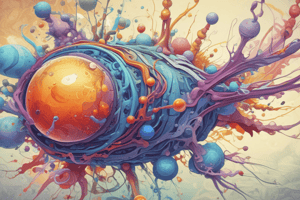Podcast
Questions and Answers
What is the primary function of antigens in the immune system?
What is the primary function of antigens in the immune system?
- To act as memory cells for future infections
- To indicate foreign substances perceived as dangerous (correct)
- To enhance the body's physical barriers
- To serve as a primary source of energy
What distinguishes innate immunity from acquired immunity?
What distinguishes innate immunity from acquired immunity?
- Acquired immunity provides immediate defense
- Acquired immunity is present at birth
- Innate immunity is not specific to particular pathogens (correct)
- Innate immunity develops memory cells
Which of the following best describes the barriers in innate immunity?
Which of the following best describes the barriers in innate immunity?
- They consist of physical and chemical barriers (correct)
- They require prior exposure to pathogens
- They are solely chemical defenses
- They act as the second line of defense
Which statement about the immune response is correct?
Which statement about the immune response is correct?
What characterizes the first line of defense in the immune system?
What characterizes the first line of defense in the immune system?
What is one of the primary functions of macrophages?
What is one of the primary functions of macrophages?
Which cells are directly derived from monocytes found in blood?
Which cells are directly derived from monocytes found in blood?
Which of the following describes the role of antigen presentation in macrophages?
Which of the following describes the role of antigen presentation in macrophages?
In which body area are macrophages primarily found?
In which body area are macrophages primarily found?
Which protein system is associated with macrophages and plays a role in adaptive immunity?
Which protein system is associated with macrophages and plays a role in adaptive immunity?
Flashcards are hidden until you start studying
Study Notes
Immune System Overview
- Antigens are perceived by the immune system as foreign or dangerous substances.
- Innate immunity serves as the body's first line of defense and is non-specific.
- Involves physical and chemical barriers, macrophages, and blood proteins (complement system).
Innate Immunity
- Barriers include anatomical structures and non-specific defense mechanisms.
- Macrophages play crucial roles in phagocytosis and antigen presentation.
- Cytokines, such as interleukins and interferons, are essential for inflammation and regulating immune responses.
Inflammation
- Characterized by pain, redness, heat, and swelling at infection sites.
- Triggered by cytokines in response to microbes and antigens, leading to tissue reactions and activation of the complement system.
Complement System
- Composed of plasma proteins that, when activated, destroy microbes through a cascade reaction.
- Can result in the formation of the membrane attack complex, leading to microbial lysis.
- Two activation pathways: classical and alternative, both contributing to inflammation.
Adaptive Immunity
- Develops specific immune responses over time, distinguishing between closely related microbes.
- Characterized by high specificity, memory, and clonal expansion of antigen-specific cells.
Key Components of Adaptive Immunity
- Comprises B cell and T cell lymphocytes with distinct functions.
- B cells (bone marrow origin) are responsible for humoral immunity through antibody production.
- T cells (thymus origin) are involved in cell-mediated immunity with cytotoxic and helper roles.
Lymphoid Organs
- Primary (central) lymphoid organs include the bone marrow and thymus where immune cells mature.
- Secondary (peripheral) lymphoid organs including lymph nodes and mucosal tissues trap antigens and are sites for immune responses.
Oral Innate Immune Mechanisms
- The mouth has unique defenses: oral mucosa, salivary secretions, and gingival crevicular fluid act as barriers against pathogens.
- Extra-oral and intra-oral lymphoid tissues enhance immune surveillance.
Granulocytes in Innate Immunity
- Neutrophils, eosinophils, and basophils play different roles, with neutrophils being the most abundant and vital for phagocytosis.
- Eosinophils are essential in combating parasitic infections, and basophils are involved in inflammatory responses.
Summary of Immune Response Mechanisms
- Innate immunity provides immediate and non-specific responses while adaptive immunity develops specific and long-lasting protection through memory cell formation.
Studying That Suits You
Use AI to generate personalized quizzes and flashcards to suit your learning preferences.




